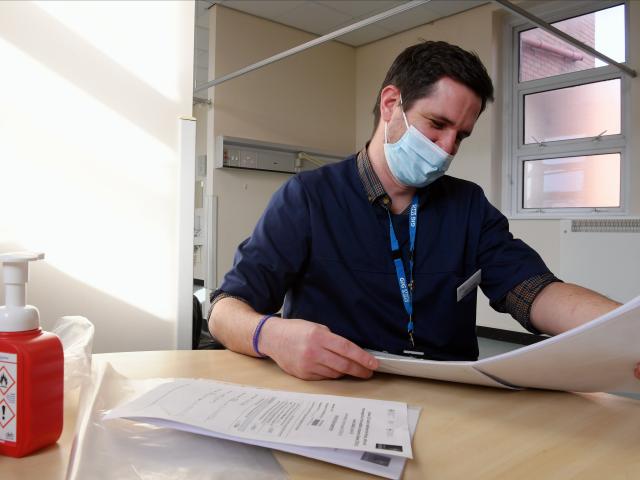
First work programme of the Wales COVID-19 Evidence Centre helps to address new challenges faced by the NHS and social care
21 September
The Welsh Government’s £3m Wales COVID-19 Evidence Centre has been analysing 17 different research priorities since its creation six months ago, providing crucial scientific evidence to help health and care services tackle new challenges created by the pandemic.
Its work programme has so far included a review of research on the impact on the mental health of health and social care workers in the UK; infection prevention in schools and education settings; vaccination uptake in adults from underserved communities, tackling cancer investigation backlogs; and the effectiveness of face coverings.
The Wales COVID-19 Evidence Centre, which is part of Health and Care Research Wales, enables rapid access to key international research findings and allows fast and focused research studies to be undertaken at a Wales level to guide decision-making by ministers as well as leaders in the NHS and social care.
The full work programme including published reviews to date can be found on the Health and Care Research Wales website.
Director of the Centre, Professor Adrian Edwards said: “To identify the most current and emerging COVID-19 health and care priorities across Wales since the pandemic began, the centre has reached out to 39 stakeholder groups including NHS health boards, Health and Care Research Wales research infrastructures, patient and public involvement groups, Social Care Wales and the Academy of Royal Colleges.
“Through discussion with the Welsh Government’s Technical Advisory Cell/Group, we identified existing priorities and asked them to agree which of these remained the highest priority, to form the initial WC19EC work programme.
“The overarching priority for our research is to be quickly but rigorously undertaken, synthesised and made available and actionable to clinicians, policy-makers and other stakeholders.”
The Wales COVID-19 Evidence Centre’s review on the effectiveness of face coverings was used in July 2021 to inform Wales’ move to Alert level 0, and how face coverings, along with hand hygiene, social distancing and ventilation remain key elements of the strategy to control the impact of COVID-19.
Information from the Evidence Centre’s rapid evidence summary on ‘Vaccination uptake (barriers/facilitators and interventions) in adults from underserved or hard-to-reach communities’ was also used in recent vaccine passport advice from the Welsh Government Technical Advisory Group.
The core team of the Centre works closely with collaborating partners in Health Technology Wales, Wales Centre for Evidence-Based Care, Specialist Unit for Review Evidence Centre, SAIL Databank, Public Health Wales, Bangor Institute for Health & Medical Research/Health and Care Economics Cymru, and the Public Health Wales Observatory.
Professor Edwards added: “We continue to review the priority questions especially relating to the impact on key services such as cancer, elective surgery and the management of long-term conditions, and innovations to address them. We are particularly concerned to investigate the unequal effects of the pandemic across groups in society such as those facing economic disadvantage, living with disability, those with lived experience of BAME, LGBTQ+ or gender inequality, and efforts to mitigate these disadvantages.”
The aim of the Centre is to provide around 50 reviews per year, answering the priority questions for policy and practice in Wales.
Director of Health and Care Research Wales, Professor Kieran Walshe said: The Centre is there to help government and the NHS use research to guide policy and practice on COVID-19. The pandemic has been the biggest challenge to the health and care sector in living memory and the Centre is providing the key research that enables us to respond quickly and effectively to that challenge.
“Ending the pandemic relies fundamentally on research delivering solutions to diagnosis, treatment and prevention and I am really grateful to Professor Edwards and his team for the work so far in addressing some of the far-reaching impacts of COVID-19.”